How to beat Candy Crush Saga
King's Candy Crush Saga is at the top of the chart of the most profitable apps thanks to several key features. The game is extremely accessible, since you can play the game both online and offline. She has a low entry barrier and the game to the fullest uses virality. The graphics and sound in the game are beautiful and extremely attractive. It is also impossible not to mention the progress on the basis of the card, which provides players with the relevance of the game even if they play it once a year. So how can you beat this game?
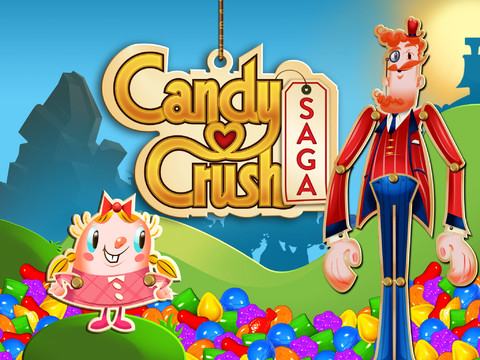
Game mechanics
')
The economy of CCS is based on energy consumption. Players consume one heart (energy) each time they fail and begin a level anew. As soon as the players run out of hearts, they have three options for further action: wait, ask or buy them. Players return to the game using a timer (wait until the energy is replenished) and virality, which I will describe in the appropriate section of this article.
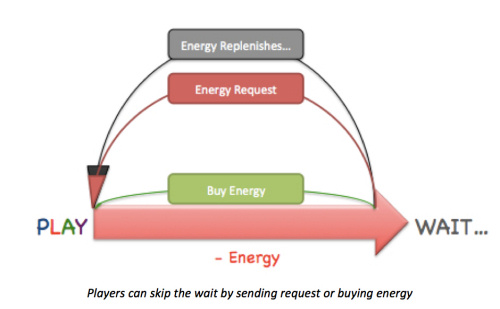
Excess of meaningful virality
Initially, CCS was developed as a game for Facebook, and, despite the fact that it was completely rewritten for mobile devices, its social roots are very noticeable - in particular, how easily sharing and queries occur in it. It seems that most players even allow CCS to post Facebook posts on their behalf.
CCS Virality consists of two main aspects: cooperation and rivalry. Players interact by swapping hearts and helping each other gain access to paid levels. On the other hand, rivalry is shown on the progress screen, which is based on a map, and a list of leaders based on levels.
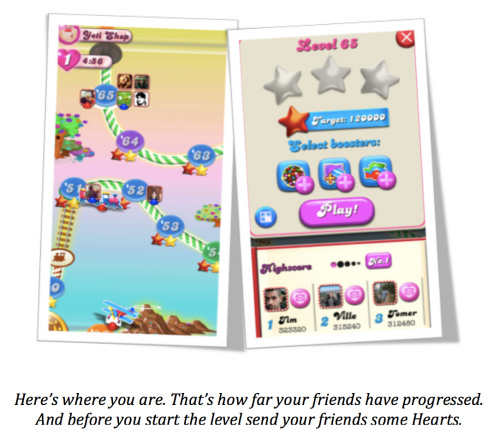
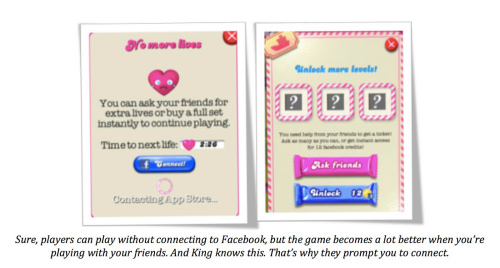
At first glance, CCS seems to be an application that is trying hard to spam the player. But in fact, their approach to virality is thoroughly thought out. First of all, virality plays a key role in the mechanics of the game and replaces the premium currency. Secondly, the CCS virality is always (or almost always) valuable both at the level of sharing and at the level of clicks. Thirdly, in CCS, the possibility of cooperation is well thought out, since helping the player makes it possible to see his progress. In other words, CCS creates a competitive spirit through cooperation.
Sharing value:
Click Value:
The rivalry is caused by:
Low rates and high income
There is no premium currency in CCS. Players can not buy entire sets of resources. The most expensive purchase a player can make is $ 39.99, and this purchase can be made only once. In fact, most of the purchases in the game amount to the purchase of extra moves and hearts, which cost $ 0.99. However, despite all these limitations, CCS is well monetized using three categories of purchases: permanent accelerators, expendable accelerators and the pay-to-continue system.
Permanent boosters
The player can purchase three different permanent accelerators. These boosters are sold in the game store and there is literally no advertising in it to promote their distribution. For me, this is a sign that these boosters are not selling very well and / or they screwed up with the retention and monetization of the players who purchased them (the game may seem too easy for players who have purchased permanent accelerators).
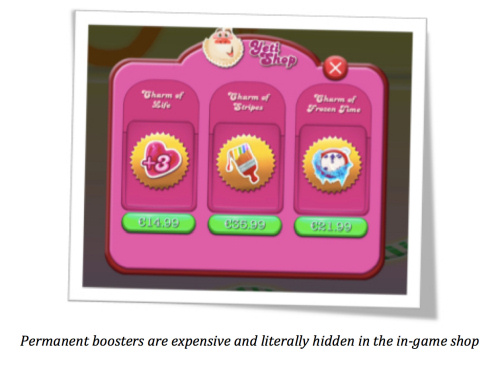
Consumable accelerators
Before starting the level, players can purchase three different types of expendable accelerators, which can help players make a quick dash at the start. These consumable accelerators open as progress progresses and differ depending on the level (for example, acceleration levels differ from accelerators in levels based on the number of turns).
Consumable accelerators are offered to players during their acquaintance with the mechanics of the game. When a new bonus is opened, the player can try it out for free to learn how to use the bonuses and understand how they can help you complete the level.
Pay to continue
The main part of the profit CCS bring micro transactions, through which players buy hearts, additional moves and unlock new levels. The constant demand for these purchases creates a need for progress and well-designed bonus points.
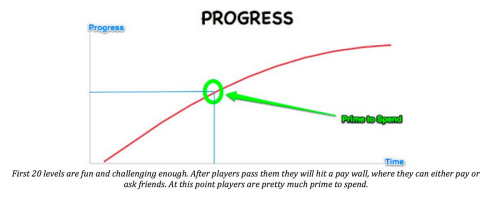
Improve and simplify
So how do you beat CCS? Well, firstly you have to simplify everything. Compared to similar games like Zynga's Bubble Safari, CCS is much easier. There are no experience points or player levels. Also, there is no simple or premium currency. In-game store does not advance and can boast only three items of goods. I think this simplicity encourages users to play and pay.
Secondly, you should introduce low rates and convince your players to spend this dollar. Personally, I noticed that when players who usually avoid purchases inside the app notice expensive items inside the game store, they become very cautious, because pressing the wrong button will cost them $ 20. But when the same players are surrounded by goods at prices ranging from $ 1 to $ 3, they feel more comfortable and make several purchases at a time (that is, they do the same as when they are in the AppStore).
In my opinion, the success of CCS is based on excellent integration of virality (collaborate and compete), focus on progress (pay to continue), flexible rates (very cheap disposable items) and, of course, excellent gameplay, accompanied by excellent graphics. Can you do better? It will not be easy.

Game mechanics
')
The economy of CCS is based on energy consumption. Players consume one heart (energy) each time they fail and begin a level anew. As soon as the players run out of hearts, they have three options for further action: wait, ask or buy them. Players return to the game using a timer (wait until the energy is replenished) and virality, which I will describe in the appropriate section of this article.

Excess of meaningful virality
Initially, CCS was developed as a game for Facebook, and, despite the fact that it was completely rewritten for mobile devices, its social roots are very noticeable - in particular, how easily sharing and queries occur in it. It seems that most players even allow CCS to post Facebook posts on their behalf.
CCS Virality consists of two main aspects: cooperation and rivalry. Players interact by swapping hearts and helping each other gain access to paid levels. On the other hand, rivalry is shown on the progress screen, which is based on a map, and a list of leaders based on levels.


At first glance, CCS seems to be an application that is trying hard to spam the player. But in fact, their approach to virality is thoroughly thought out. First of all, virality plays a key role in the mechanics of the game and replaces the premium currency. Secondly, the CCS virality is always (or almost always) valuable both at the level of sharing and at the level of clicks. Thirdly, in CCS, the possibility of cooperation is well thought out, since helping the player makes it possible to see his progress. In other words, CCS creates a competitive spirit through cooperation.
Sharing value:
- Instrumental: The feed is the result of rewards, or stimulated by the hope of rewards if another player responds - requests for help in unlocking further levels in CCS are a great example of that.
- Hedonistic: A feed allows you to demonstrate personal achievement and / or productivity
- Socially determined: A feed seeks cooperation, promising mutual benefits, or social gestures in the form of partnership or investment
- Altruistic: Flow provides increased self-esteem when you give something away for free or provide disinterested help
Click Value:
- Promotion: Encourages player response to requests; promises immediate reward or progress
- Provocation: The feed provokes a return to the game, using the spirit of rivalry (Take revenge!), Empathy (Save the panda!) Or curiosity (Jack has just earned a million dollars!)
- Social commitment: Feed encourages reciprocal social gestures (gifts, help), or social connections that they represent (Linda invested in you; New buildings appeared in Jim. Thanks to everyone who helped!)
The rivalry is caused by:
- Friends visiting each other's playing areas (these visits may be due to quests or rewards for such visits)
- Leaderboard (How many levels did Jason beat me to?)
- Willingness to brag (I finished Building X!)
- Inquiries demonstrating how much the player has advanced in the game (Help me defeat Enemy Y!)
Low rates and high income
There is no premium currency in CCS. Players can not buy entire sets of resources. The most expensive purchase a player can make is $ 39.99, and this purchase can be made only once. In fact, most of the purchases in the game amount to the purchase of extra moves and hearts, which cost $ 0.99. However, despite all these limitations, CCS is well monetized using three categories of purchases: permanent accelerators, expendable accelerators and the pay-to-continue system.
Permanent boosters
The player can purchase three different permanent accelerators. These boosters are sold in the game store and there is literally no advertising in it to promote their distribution. For me, this is a sign that these boosters are not selling very well and / or they screwed up with the retention and monetization of the players who purchased them (the game may seem too easy for players who have purchased permanent accelerators).

Consumable accelerators
Before starting the level, players can purchase three different types of expendable accelerators, which can help players make a quick dash at the start. These consumable accelerators open as progress progresses and differ depending on the level (for example, acceleration levels differ from accelerators in levels based on the number of turns).
Consumable accelerators are offered to players during their acquaintance with the mechanics of the game. When a new bonus is opened, the player can try it out for free to learn how to use the bonuses and understand how they can help you complete the level.
Pay to continue
The main part of the profit CCS bring micro transactions, through which players buy hearts, additional moves and unlock new levels. The constant demand for these purchases creates a need for progress and well-designed bonus points.

Improve and simplify
So how do you beat CCS? Well, firstly you have to simplify everything. Compared to similar games like Zynga's Bubble Safari, CCS is much easier. There are no experience points or player levels. Also, there is no simple or premium currency. In-game store does not advance and can boast only three items of goods. I think this simplicity encourages users to play and pay.
Secondly, you should introduce low rates and convince your players to spend this dollar. Personally, I noticed that when players who usually avoid purchases inside the app notice expensive items inside the game store, they become very cautious, because pressing the wrong button will cost them $ 20. But when the same players are surrounded by goods at prices ranging from $ 1 to $ 3, they feel more comfortable and make several purchases at a time (that is, they do the same as when they are in the AppStore).
In my opinion, the success of CCS is based on excellent integration of virality (collaborate and compete), focus on progress (pay to continue), flexible rates (very cheap disposable items) and, of course, excellent gameplay, accompanied by excellent graphics. Can you do better? It will not be easy.
Source: https://habr.com/ru/post/181332/
All Articles